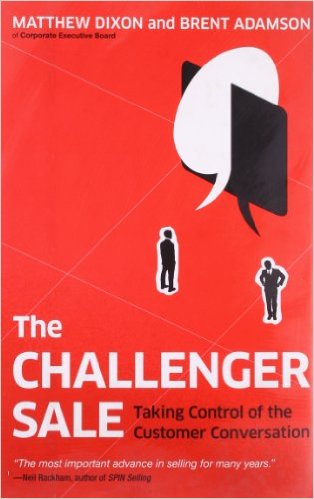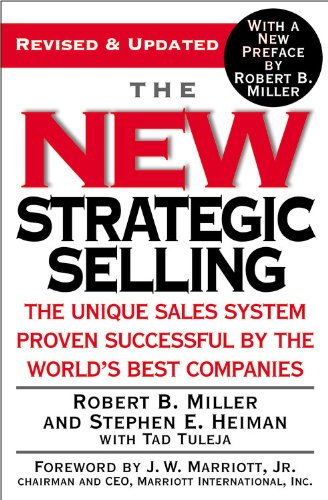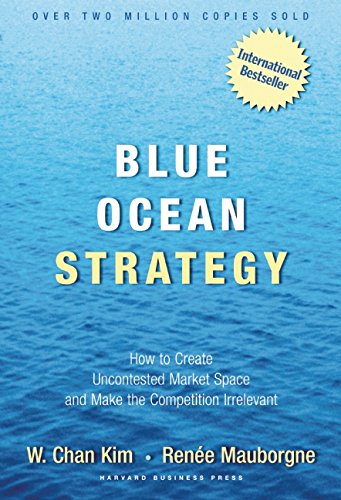Are You Helping Your Clients/Customers, or Selling Them?
In preparation for an upcoming blog series, I'm reading a book that was recommended to me by a client: The Challenger Sale (the authors are Matthew Dixson and Brent Adamson). According to the authors, it seems like most B2B businesses want to obtain new clients/customers, but few are able to execute their plan. Here are just a few helpful tidbits I discovered in the book:
- A business services sales director told the authors his company has 100 sales reps, but just two of those individuals are responsible for 80 percent of the company's revenues
- At the conclusion of the authors' study of more than 6,000 sales reps, they decided on a name for the most successful reps — "The Challenger" — and determined that all of these individuals possess three strong traits: teaching, tailoring and taking control.
- In a survey of more than 5,000 B2B customers, the answer 53 percent of the time, when asked "Why do you select a particular supplier?" was "The sales experience." The second most common answer (19 percent of the time) was "The company and brand impact."
- Customer loyalty is won out in the field
Here's what the clients/customers say about the types of sales reps labeled "The Challenger":
- They offer unique and valuable perspectives on our market.
- They help me navigate alternatives.
- They provide ongoing advice or consultation.
- They help me avoid potential land mines.
- They educate me on new issues and outcomes.
Suffice it to say that at Doescher Advisors, we believe the most successful new business developers "help" their clients/customers; they do not "sell" them.
Are You Easily Accessible to Your Clients/Customers?
A survey cited in The Challenger Sale, by Matthew Dixson and Brent Adamson, reported that the second most important factor (95 percent) driving customer loyalty is accessibility. I commented on this very subject before, in my blog entitled "How Accessible Are You?"
I believe too many businesses, both large and small, have substantially reduced their accessibility by hiding behind technology. (Think about this: What does it really cost to have someone answer the phone during normal business hours?)
Today, you can easily distinguish yourself from the competition by simply answering your phone or responding to an email in a prompt and timely fashion.
Have you performed an evaluation of your client/customer touchpoints? Have you talked with your key clients/customers about their experience with your company's accessibility? As I mentioned back in my 2013 blog, I changed doctors due to my physician's lack of accessibility. (I can feel some of you pushing back right now; I know you're busy, but what's more important than being responsive to your clients/customers?)
Do You Have the Courage to "No Quote"?
When I have reviewed client data regarding successful quotes on new business, I've generally found a very low hit rate. In reflecting on why this might be the case, it seems that often we (yes, I fall into this trap, too) like being busy, and preparing a proposal or bid makes us feel good because we believe we're accomplishing something — when, in fact, it's probably a waste of time.
In The Challenger Sale, Matthew Dixson and Brent Adamson stated that the successful "Challenger" reps continually assess the likelihood of closing the sale. If they determine there's a low probability of closing, they're quick to cut the sales effort short and move on to the next opportunity.
In my observation, many companies don't put a high value on time. I would suggest applying the old adage of "quality over quantity" when it comes to new business.
What's your success rate on new business quotes? If you were to spend more time on new business opportunities, would you guess your success rate would be higher? Rather than wasting your efforts on creating quotes for low-probability business, would you be better off if you moved along to the next potential new business client?
Here's a Doescher Advisors Proverb: It is better to be profitable than busy.
Words, Words, Words
I have written on the subject of "words" before, but I recently spent a little more time thinking about the topic while reading some very good business books. I believe the words you use influence — and have a definite impact on — how you think and behave.
In the books I was reading, many of the authors refer to their clients/customers as "accounts." I assume they mean accounts receivable — or maybe accounts payable? (Just kidding.)
Seriously, though, if you were the client/customer, would you like to be referred to as an "account"?
I would highly recommend proudly referring to the companies you serve as your customers/clients. I bet you worked really hard to obtain their business, and you continue to work hard to provide them with great products and services.
Strategic Selling: Ideal Customers
Later this year, I plan to post a series of suggestions related to the best practices for obtaining new customers/clients. As part of the preparation for that series, I recently finished reading The New Strategic Selling by Robert B. Miller, Stephen E. Heiman, Tad Tuleja and J.W. Marriott. If your job responsibilities include business development, I think reading this book would absolutely be worth your time. The authors touch on several of my favorite subjects, which I will comment on in the next several blogs.
First, though, what is an ideal customer/client? (Honestly, is that something you've ever thought about?) The authors offer the following list of "best customer" characteristics:
- They trust my company's performance.
- They have innovative, progressive management.
- They're loyal to the vendors I've selected.
- They're committed to quality control.
- They're willing to pay for "value-added" aspects of my product.
- They demonstrate the highest business ethics and integrity.
- They want a win-win relationship on every sale.
The authors follow that up with a list of "worst customer" characteristics:
- They're inflexible on price.
- They're slow in making buying decisions.
- They have no loyalty to my company or to me.
- They have an authoritarian management system.
- They're secretive and unwilling to cooperate.
- They want me to lose so they can win.
It might be a good idea to evaluate your customers/clients using the above criteria, plus anything else that's important to you. And then take action. With the generally strong economy, now is a great time to separate from your worst customer/client. It's scary, but you'll be glad you did it — and so will your team!
Strategic Selling: Influencers
Probably some of the best material found in The New Strategic Selling by Miller, Heiman, Tuleja and Marriott comes in the form of the tips the authors offer their readers on understanding how companies buy products and services. The authors suggest there are four buying influences:
Economic Buying Influence — Who at the customer/client will give the final economic approval to buy? There have been plenty of situations over the years where people have missed this one. Is there money in the budget? Will the owner/CEO have to approve? Is someone else's approval required? Do you know that individual?
User Buying Influences — This one is kind of obvious, but here's a recent example. I have a client who has strong relationships with the owner/CEOs at many companies, but he doesn't know the users yet. He needs to identify the users who have buying influence and develop relationships with them, too.
Technical Buying Influences — These are the gatekeepers. They may not always have big titles, but they have veto rights.
Coaches — The role of the coach is to guide you in the sales process. I like to call them "insiders." I recommend that you establish an "insider" relationship with every major customer/client. This should be someone who, for whatever reason, likes you and your company, and wants you to be successful. I am NOT suggesting anything unethical. I will probably touch on this subject more in my upcoming series of best practices for obtaining new customers/clients.
The authors do a great job of explaining each role. In my experience, many sales have been lost because there were not relationships in place with all four types of influencers.
Have you lost any sales due to this?
Strategic Selling: Competitors
I have commented on this subject before. In my May 13, 2013, post, "Talking Down About Competitors," I recommended not bad-mouthing your competitors. Meanwhile, in my April 23, 2012, post, "Create Your Own Path," I recommended the book Blue Ocean Strategy, by W. Chan Kim and Renee Mauborgne, and talked about the concept of listening to your customers/clients and providing them with something new and different to meet their needs.
Here are two quotes from my newest favorite book, The New Strategic Selling:
- "We have long held that one of the commandments for losing in business is to concentrate on the competitor rather than the customer."
- "The alternative is to think far less about what the competition is doing, has done, or might do, and more about what selling is about in the first place — the providing of customized solutions to individuals' problems."
My question is simple: Where is your focus — the customer/client, or the competition? What would I hear if I listened in on your Leadership Team meetings?
Strategic Selling: Hucksters
As I continue my series, here's a quote from The New Strategic Selling, by Robert B. Miller, Stephen E. Heiman, Tad Tuleja and J.W. Marriott: "If you are to be successful in strategic selling, you'll have to leave the old-time huckster philosophy where it belongs — in the past — and learn how to dig for a real fit between what you have and what your customers need."
The authors provide the following common-sense advice:
- The only competitive strategy that can bring you success is a strategy in which you keep your eye on the customer.
- A Hollywood agent's advice to his actor client was, "We're in Tinseltown. If you can fake sincerity, you�ve got it made." The authors' response is, "Maybe in Tinseltown, but not in the world of selling. Not if you want to build a reputation for credibility — which, as we've said, is the one thing you cannot do without."
- By establishing low-pressure relationships with numerous buying influences, you'll be positioning yourself to capitalize on them when they're ready to buy.
If you're responsible for business development, is this how you think and behave? If you're an owner/CEO or a sales manager, is this the advice you offer to your new-business developers?
Strategic Selling: The Big Surprise About Motivating Your Business Developers
I will definitely be providing some suggestions for motivating rather than demotivating your business developers in my blog series related to best practices for obtaining new customers/clients. For now, in my final post based on The New Strategic Selling by Miller, Heiman, Tuleja and Marriott, I will provide another direct quote from the authors. In listening to business owners/CEOs for years, I believe this quote will come as a big surprise:
"In every survey we have seen, the researchers reach the same 'surprising' conclusion that what really turns good salespeople on is not their six-figure commissions but job satisfaction, recognition and challenges. The popular belief that the top salespeople are in it just for the money always turns out to be a misconception."
I would suggest this might even be a controversial conclusion.
Seek. Climb. Lead.
|
|




Read more reviews
and order from Amazon.


Read more reviews
and order from Amazon.


Read more reviews
and order from Amazon.
|

